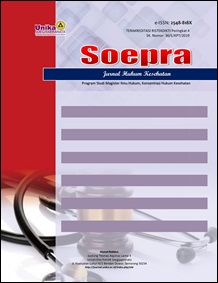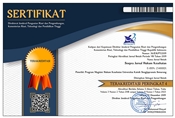Regulations for Organizing Immunizations in Indonesia
Abstract
Immunization is an effort to increase a person's immunity through the administration of antigens to prevent certain diseases which are packaged in the form of programs organized by the Government in the implementation of preventive health efforts. In 2021, during the time when the Covid-19 pandemic hit Indonesia, only 79.6% of children in Indonesia received complete basic immunization. The government implements the immunization program through the Ministry of Health. Based on the implementation, there are several types of immunization, namely routine immunization and follow-up immunization. This study uses an analytic descriptive research method with a normative juridical research approach. The results of the study are: 1) Immunization in Indonesia is carried out based on the provisions of the 1945 Constitution of the Republic of Indonesia, the Law of the Republic of Indonesia Number 36 of 2009 concerning Health and the Law of the Republic of Indonesia Number 35 of 2014 concerning Amendments to Law Number 23 of 2002 Concerning Child Protection. 2) Implementation of immunization in Indonesia is regulated by Regulation of the Minister of Health Number 12 of 2017 concerning Implementation of Immunization which includes types of immunization, implementation of immunization programs, implementation of selected immunizations, monitoring and prevention of kipi (adverse events after immunization), research and development, community participation, recording and reporting and guidance and supervision aimed at maintaining the health of children so that they can be physically, mentally and spiritually healthy, as well as efforts to fulfill children's social rights to live free from infectious diseases and create a prosperous future for children, with the aim of fulfilling the provision of happiness that is as large as - as much as possible to as many people
Keywords
Complete Basic Immunization, Implementation of Immunization, Regulation
Full Text:
PDFDOI: https://doi.org/10.24167/sjhk.v9i1.5938
Refbacks
- There are currently no refbacks.
Copyright (c) 2023 SOEPRA








